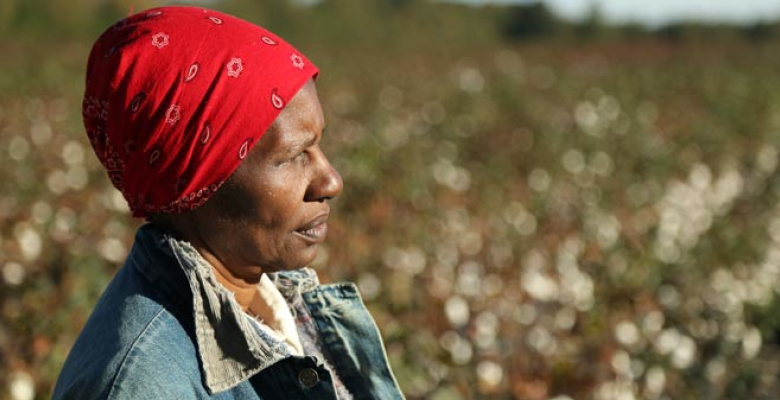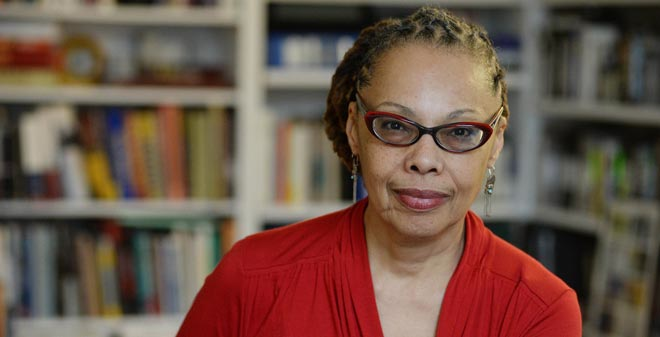Documentary Film Professor June Cross Turns Lens on HIV/AIDS in Rural South

June Cross makes documentaries that tell stories of families. A professor at the Journalism School, she is best known for the 1997 Emmy-winning film about her own family, The Secret Daughter.
The daughter of a white actress and black comedian whose mother gave her up to be raised by an African American family when she was 4, Cross also made the 2009 documentary, The Old Man and the Storm, which told the story of a New Orleans family’s efforts to rebuild their lives after Hurricane Katrina.
“I tend to do families instead of characters,” she says. “You get to see generations. You get a sense of time passing, which I think every narrative needs.\"
This theme continues with her latest film, Wilhemina’s War, about the impact of HIV/AIDS on a family in rural South Carolina, airing Feb. 29 as part of PBS’s Independent Lens series and then available for viewing on the PBS website for four months.
Related
Wilhemina’s War: Preview, Independent Lens
When the film opens, Wilhemina Dixon of Williston, S.C., population 3,000, is caring for her daughter Toni, a former drug addict dying of AIDS; her granddaughter Dayshal, born with HIV; a husband with cancer, and an aging mother with dementia. Four other family members are HIV-positive.
“The rural south is now the epicenter of the AIDS epidemic in the U.S.,” says Cross. “It’s a marker of inequality – large numbers of unemployed, little access to health care and a poor educational system.” The state has 16,000 people known to be infected with HIV, and just one doctor for as many as 10,000 people in some rural areas, she says.
Dixon, the daughter of sharecroppers, was 62 when filming began in 2009, working long days picking beans and doing odd jobs to provide for her family. Dayshal, then 15, often missed school because of the side effects of the 24 pills she took each day to control the HIV.

Over the five years that Cross followed the family, Dixon’s husband, daughter and mother died and Dayshal dropped out of school after she was bullied by classmates for writing about living with HIV. It was her story in the magazine of the South Carolina HIV/AIDS Council, that had piqued Cross’s interest in the family.
In the Bible Belt South especially, people with HIV/AIDS often are shunned by their community and demonized by their church, says Cross. With little formal education but determined to fight the stigma, Dixon joined with advocates from the council to encourage people to talk about the disease, get tested and stay in treatment.
“We have to stop thinking of those with HIV/AIDS as ‘these people,’” says Cross. “They are our cousins, our brothers and sisters, mothers and fathers.”
Cross, 61, grew up in Atlantic City, N.J. and visited her mother regularly in California. Her stepfather was the F Troop actor Larry Storch. She says she decided to become a journalist in eighth grade after a reporter from The Philadelphia Inquirer visited her school.
“He said he had an American Express card that allowed him to travel all over the world and ask people questions that were none of his business,” Cross recalls. “I was in, immediately.”
She joined the Journalism School as an adjunct in 2000 after working at PBS NewsHour, the CBS Evening News and PBS Frontline, and became a professor in 2006. The documentary film program she created is now in its fifth year, with 32 students, about twice as many as when it started.
In 2009, working with a former student, Lisa Desai (JRN’07) and a small grant from the Ford Foundation, Cross went to the rural South, where data showed high rates of AIDS, especially among African Americans. “They haven’t done anything except have sex, something everyone – or their parents – has done,” she says.
The hardest part of making the film was raising money, Cross says, estimating the total cost at more than $500,000 for a cameraman, editor and travel expenses, among other things. In addition to the Ford grant, she got funding from the AIDS Healthcare Foundation and raised the remainder herself.
Dixon and her granddaughter have accompanied Cross to film festivals where the documentary was shown, traveling by plane for the first time. Wilhemina Dixon started to cry when she first saw the film, Cross recalls, saying, “When I was doing it, I was thinking about the others. Now that I see what I went through, it breaks my heart.”
Cross exchanges text messages with Dayshal, now 21, who is enrolled in a G.E.D. program, hoping to get a high school diploma and perhaps go on to college. “Wilhemina and I are almost like sisters at this point,” Cross says. “You can’t make a movie like this and just walk away.”